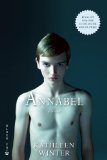Summary | Excerpt | Reading Guide | Reviews | Beyond the Book | Readalikes | Genres & Themes | Author Bio

A Novel
by Kathleen Winter
When Jacinta was not groaning with the mind-stopping
agony of having her pelvic bones wrenched apart by the
baby that was coming, she too indulged in the dream. “I
don’t believe I’d stay here at all,” she told her friends as
she poured scalding coffee from the small enamel pot,
her belly as big as a young seal under her blue apron covered
in tiny white flowers. “I’d move back to Monkstown
Road and if I couldn’t get a job teaching I’d get my old
job back at the Duckworth Laundry, washing white linen
for the Newfoundland Hotel.”
Thomasina was the only woman who did not indulge.
She had not had a father, and she regarded her husband,
Graham Montague, with great respect. She had not got
over the fact that he could fix anything, that he did not
let the house grow cold, that he was the last man to leave
for his traplines and the first to come home to her, that
he was blind and needed her, or that he had given her
Annabel, a red-haired daughter whom she called my bliss
and my bee, and who helped her father navigate his canoe
now that she was eleven years old and had a head on her
as level and judicious as Thomasina’s own. Graham was
out now, as were all the hunters in Croydon Harbour, on
the river in his white canoe, and Annabel was with him.
She rode the bow and told him where to steer, though he
knew every movement he needed to make with his paddle
before Annabel told him, since before she was born he
had travelled the river by listening and could hear every
stone and ice pan and stretch of whitewater. He told her
stories in the canoe, and her favourite was a true story
about the white caribou that had joined the woodland
herd and that her father had encountered only once, as a
boy, before he had the accident that blinded him. Annabel
looked for the white caribou on every trip, and when
Thomasina told her it might not be alive any more, or
it might have gone back to its Arctic tribe, her husband
turned his face towards her and silently warned her not
to stop their daughter from dreaming.
As her baby’s head crowned, Jacinta’s bathroom
brimmed with snow light. Razor clam shells on her windowsill
glowed white, and so did the tiles, the porcelain,
the shirts of the women and their skin, and whiteness
pulsed through her sheer curtains so that the baby’s hair
and face became a focal point of saturated colour in the
white room; goldy brown hair, red face, black little eyelashes,
and a red mouth.
Down the hall from Jacinta’s birthing room, her
kitchen puckered and jounced with wood heat. Treadway
dropped caribou cakes into spitting pork fat, scalded his
teabag, and cut a two-inch-thick chunk of partridgeberry
loaf. He had no intention of lollygagging in the house
during the birth — he was here for his dinner and would
slice through Beaver River again in an hour in his white
canoe. His hat was white and so were his sealskin coat
and canvas pants and his boots. This was how generations
of Labrador men had hunted in the spring.
A duck could not tell a white hunter’s canoe from
an ice pan. The canoe, with the hunter reclining in it,
slid dangerously through the black water, silently slowing
near the flock, whether the flock flew high overhead or
rested their fat bellies on the water’s skin. Treadway lived
for the whiteness and the silence. He could not see with
his ears as Graham Montague could, but he could hear,
if he emptied himself of all desire, the trickle of spring
melt deep inland. He could inhale the medicinal shock
of Labrador tea plants with their leathery leaves and
orange, furry undersides, and watch the ways of flight
of the ducks, ways that were numerous and that told a
hunter what to do. Dips and turns and degrees of speed
and hesitation told him exactly when to raise his gun and
when to hide it. Their markings were written on the sky
as plain as day, and Treadway understood completely
how Graham Montague could hit ducks accurately even
though he was blind, for he had himself noticed the constant
mathematical relationship between the ducks’ position
and the hollow, sweeping sounds their wings made, a
different sound for each kind of turning, and their voices
that cracked the silence of the land. The movements of
the ducks were the white hunter’s calligraphy.
Excerpted from Annabel by Kathleen Winter. Copyright © 2011 by Kathleen Winter. Excerpted by permission of Grove Press. All rights reserved. No part of this excerpt may be reproduced or reprinted without permission in writing from the publisher.
Choose an author as you would a friend
Click Here to find out who said this, as well as discovering other famous literary quotes!
Your guide toexceptional books
BookBrowse seeks out and recommends the best in contemporary fiction and nonfiction—books that not only engage and entertain but also deepen our understanding of ourselves and the world around us.